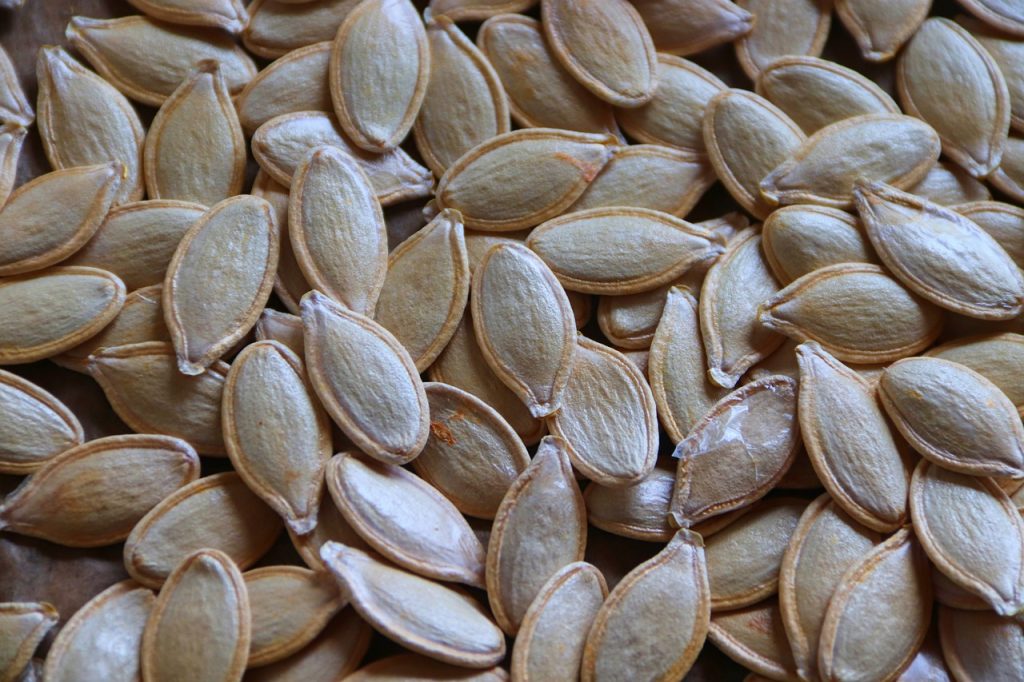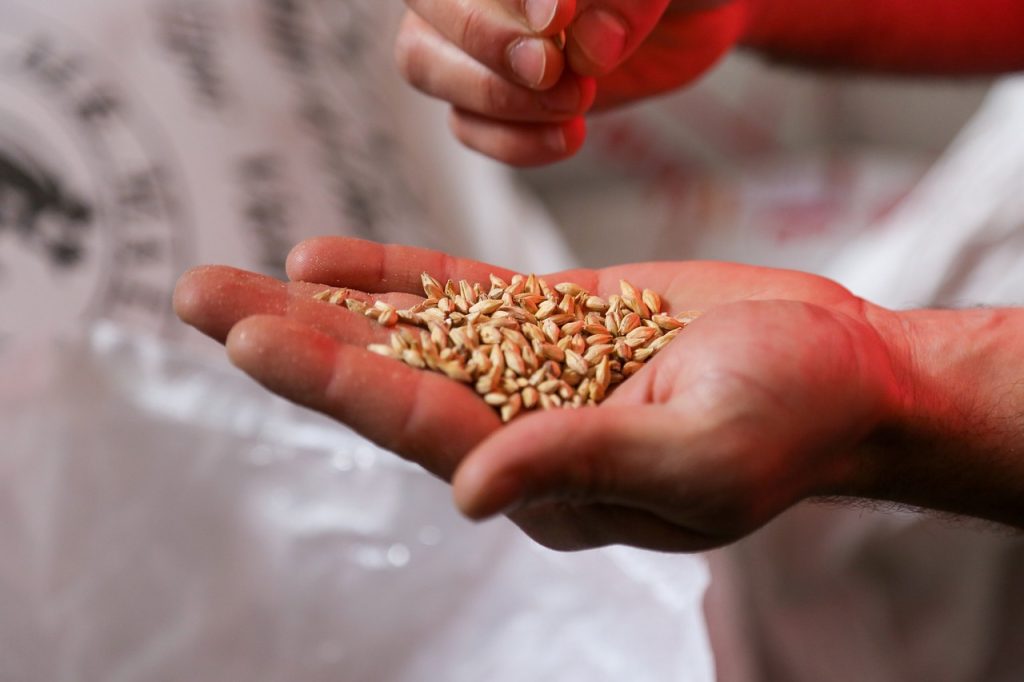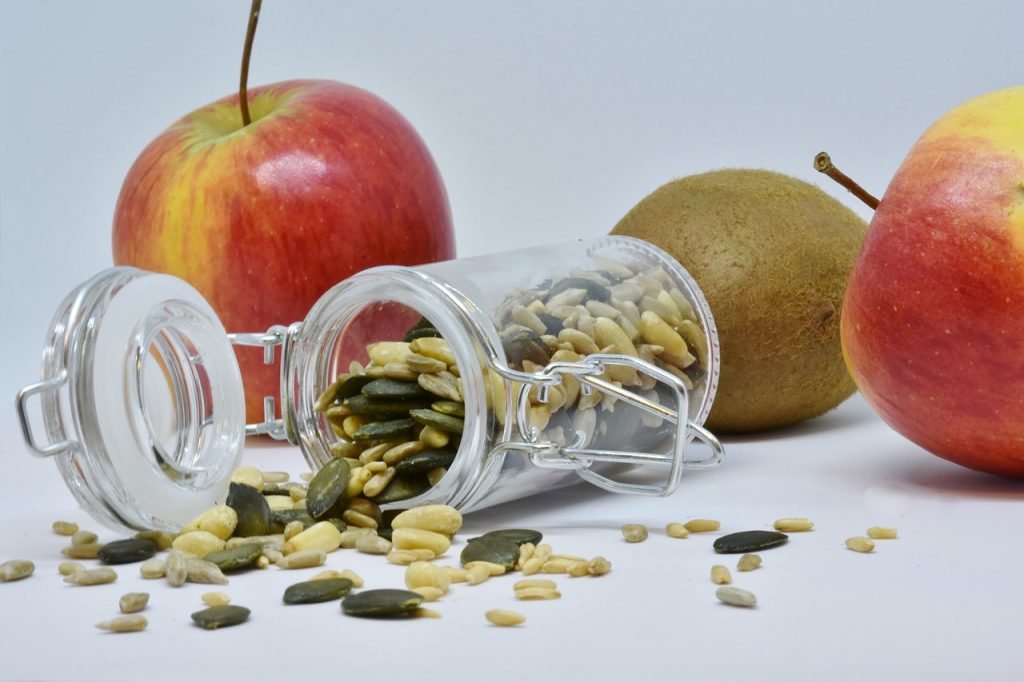Are Pumpkin Seeds Low FODMAP? Must Know For IBS Sufferers!
Many people on a low FODMAP diet wonder – are pumpkin seeds low FODMAP? If you’re wondering the same thing, then you’re in the right place!
Good news! Pumpkin seeds are indeed considered a low FODMAP food, making it a suitable addition to your diet if you’re managing irritable bowel syndrome or other digestive issues.
In this guide, we will tell you how to use pumpkin seeds in a low-FODMAP meal-plan and also discuss Low-FODMAP seeds to use as alternatives to pumpkin seeds.
Are Pumpkin Seeds Low FODMAP?

Pumpkin seeds are low in FODMAPs, making them a suitable choice for those following such a diet. In addition to being a great choice for snacking alone, pumpkin seeds can also be incorporated into various recipes, such as crackers or other delectable baked goods.
It’s essential, however, to always check the other ingredients in those recipes to ensure that the final product remains low in FODMAPs. Let us take a look at the sugar content in pumpkin seeds:
Sugar Content
Here’s a table presenting the glucose, fructose, and excess fructose content per typical serving of pumpkin seeds:
| Nutrient | Amount (per 28g/1 oz serving) |
|---|---|
| Glucose | 0.07g |
| Fructose | 0.06g |
| Excess Fructose | 0g |
Please note that these values are approximate and may vary slightly depending on factors such as seed variety and preparation methods.
Remember that moderation is essential, and it’s always best to monitor your individual tolerance levels when introducing new foods to your low-FODMAP diet.
Nutritional Benefits of Pumpkin Seeds
Pumpkin seeds are not only tasty snacks but also packed with nutrients that can provide numerous health benefits. Let’s find out more about their nutritional values.
Antioxidants, Fiber, and Minerals
Pumpkin seeds are a rich source of healthy fats, dietary fiber, and essential minerals like magnesium, zinc, and copper.
They also contain a good amount of protein, making them an excellent addition to a balanced diet. Not only that, but these seeds are also rich in antioxidants and have been linked to heart health and immune function.
Versatile Addition to Meals
Additionally, pumpkin seeds are versatile for culinary purposes, as they can be used in a variety of dishes or consumed on their own as a delicious and nutritious snack. Some popular ways to enjoy pumpkin seeds include adding them to yogurt, salads, and smoothies, or even baking them into bread or other baked goods.
Nutritional Content
Here is a simple nutritional table that shows the benefits of pumpkin seeds per 1-ounce (28 grams) serving:
| Nutrient | Amount |
|---|---|
| Calories | 151 |
| Total Fat | 13g |
| Saturated Fat | 2.4g |
| Protein | 7g |
| Carbohydrates | 5g |
| Dietary Fiber | 1.1g |
| Magnesium | 150mg |
| Phosphorus | 326mg |
| Potassium | 226mg |
| Copper | 0.43mg |
Alternatives for Low FODMAP Seeds

If you are following a low FODMAP diet and looking for alternatives to pumpkin seeds, don’t worry – there are a variety of options available. Here are some examples of seeds that can work well when maintaining a low FODMAP lifestyle:
Chia seeds
Chia seeds are an excellent substitute for pumpkin seeds. They are not only low in FODMAPs, but also packed with nutrients such as omega-3 fatty acids, protein, and fiber. Plus, they can easily be added to various dishes like smoothies, oatmeal, or yogurt.
Sunflower seeds
Sunflower seeds are another great alternative for those on a low FODMAP diet. These seeds are rich in healthy fats, vitamin E, and several essential minerals. They can be enjoyed on their own or incorporated into recipes for added texture and nutrition.
Poppy seeds
Poppy seeds can also be included in a low FODMAP diet. These small, black seeds are often used in baking and provide a unique flavor to bread, muffins, or cakes. Just make sure to use them in moderation due to their potentially high levels of certain FODMAPs.
Also Read: Are Sesame Seeds Low FODMAP
Incorporating Pumpkin Seeds Into Your Diet

Pumpkin seeds, also known as pepitas, can be a nutritious and low FODMAP addition to your diet. Here’s how you can easily incorporate pumpkin seeds into your daily meals.
Eat Them Roasted
First, you can snack on roasted pumpkin seeds. Simply spread the seeds on a baking sheet, toss them with some olive oil, and season with salt or any low FODMAP spices you prefer. Bake them in the oven at 350°F (175°C) for about 15-20 minutes or until they’re golden brown and crunchy. You can store them in an airtight container and enjoy them as a healthy on-the-go snack.
Add Them to Salads
Another great way to add pumpkin seeds to your meal is by incorporating them into your salads. Simply toss a handful of pumpkin seeds into your favorite low FODMAP salad mix for an added boost of texture and flavor. You can also mix them with other seeds like chia or sunflower seeds for extra nutrition.
Sprinkle Over Your Breakfast
For a hearty breakfast option, you can sprinkle pumpkin seeds over your low FODMAP cereal or granola. This adds an extra crunch and enhances the nutritional value of your breakfast. You can also blend them into your low FODMAP smoothies or mix them into yogurt for a filling and nutritious start to your day.
Add Them To Rice or Quinoa
Pumpkin seeds can also be used as a tasty topping for cooked dishes. For example, add them to your low FODMAP-friendly rice or quinoa dishes for extra flavor and texture. Or, you can use them as a garnish on soups, casseroles, or roasted vegetables.
Frequently Asked Questions
Can IBS sufferers eat pumpkin seeds?
Yes, you can enjoy pumpkin seeds if you have IBS since they are considered a low FODMAP food. Including them in your diet may provide relief from common IBS symptoms without causing digestive discomfort.
Which other seeds are suitable for a low FODMAP diet?
Apart from pumpkin seeds, other seeds suitable for a low FODMAP diet include chia seeds, flax seeds, and sunflower seeds.
These seeds are nutritious and can be easily incorporated into various meals and snacks while adhering to a low FODMAP diet plan. Don’t forget to monitor your individual tolerance and adjust your intake accordingly.
How do pumpkin seeds affect digestion?
Pumpkin seeds can benefit your digestion due to their high fiber content. Fiber promotes regular bowel movements, prevents constipation, and supports overall gut health.
Additionally, pumpkin seeds are a low FODMAP option, making them less likely to trigger digestive issues in sensitive individuals, such as those with IBS.
Do pumpkin seeds cause inflammation?
Pumpkin seeds are generally not associated with inflammation. In fact, they contain anti-inflammatory compounds, such as antioxidants and omega-3 fatty acids, which may help reduce inflammation in the body.
Including pumpkin seeds in your diet can potentially contribute to better overall health by combating inflammation-related issues.
Conclusion: Are Pumpkin Seeds Low FODMAP?
Yes, pumpkin seeds are considered a low-FODMAP food, making them a delicious and nutritious choice for people following this type of diet. Enjoy them as a snack or incorporate them into your favorite recipes to add a boost of flavor and nutrition.
When it comes to adjusting your diet to be low FODMAP, be mindful of portion sizes and how you pair these seeds with other ingredients. Limiting high FODMAP foods while incorporating pumpkin seeds can help you manage your IBS symptoms effectively. Remember to always consult your doctor or a dietitian before making significant changes to your diet.

Jane Porter is an architect that like many others, had her life significantly impacted by digestive problems for many year. Trying to find a solution to her digestive problem, she came across the low FODMAP diet, a scientifically-backed approach designed to alleviate symptoms associated with irritable bowel syndrome (IBS) and other digestive disorders.







